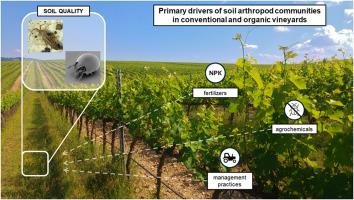当前位置:
X-MOL 学术
›
Crop Prot.
›
论文详情
Our official English website, www.x-mol.net, welcomes your feedback! (Note: you will need to create a separate account there.)
Below-ground arthropod diversity in conventional and organic vineyards: A review
Crop Protection ( IF 2.8 ) Pub Date : 2024-03-21 , DOI: 10.1016/j.cropro.2024.106666 F. Di Giovanni , F. Nardi , F. Frati , M. Migliorini
Crop Protection ( IF 2.8 ) Pub Date : 2024-03-21 , DOI: 10.1016/j.cropro.2024.106666 F. Di Giovanni , F. Nardi , F. Frati , M. Migliorini

|
Viticulture is one of the most important agricultural sectors in the Mediterranean area but also one with substantial impact on the soil ecosystem. Some of the most common practices in viticulture, such as tillage, inter-row management, fertilization and use of pesticides, can have important effects on soil communities. The latter significantly contribute to several fundamental soil processes such as decomposition, nutrient and carbon cycling, and microbiota regulation. In perspective, it is therefore necessary to assess the effects of agronomical practices on soil biological communities. The increasing shift towards organic viticulture is seen as a promising management model to maintain soil functionality and preserve soil biodiversity. Below, we present an appraisal of the main practices in conventional and organic viticulture and their possible effects on soil mesofauna. Understanding the extent to which organic practices contribute to maintaining/altering soil functionality and biodiversity is a fundamental step towards the development of an environmentally sustainable viticulture.
中文翻译:

传统和有机葡萄园的地下节肢动物多样性:综述
葡萄栽培是地中海地区最重要的农业部门之一,但也对土壤生态系统产生重大影响。葡萄栽培中一些最常见的做法,例如耕作、行间管理、施肥和农药的使用,可以对土壤群落产生重要影响。后者对一些基本的土壤过程有显着贡献,例如分解、养分和碳循环以及微生物群调节。因此,从长远来看,有必要评估农艺实践对土壤生物群落的影响。越来越多地转向有机葡萄栽培被视为维持土壤功能和保护土壤生物多样性的有前途的管理模式。下面,我们对传统和有机葡萄栽培的主要做法及其对土壤中动物的可能影响进行了评估。了解有机实践对维持/改变土壤功能和生物多样性的贡献程度是发展环境可持续葡萄栽培的基本步骤。
更新日期:2024-03-21
中文翻译:

传统和有机葡萄园的地下节肢动物多样性:综述
葡萄栽培是地中海地区最重要的农业部门之一,但也对土壤生态系统产生重大影响。葡萄栽培中一些最常见的做法,例如耕作、行间管理、施肥和农药的使用,可以对土壤群落产生重要影响。后者对一些基本的土壤过程有显着贡献,例如分解、养分和碳循环以及微生物群调节。因此,从长远来看,有必要评估农艺实践对土壤生物群落的影响。越来越多地转向有机葡萄栽培被视为维持土壤功能和保护土壤生物多样性的有前途的管理模式。下面,我们对传统和有机葡萄栽培的主要做法及其对土壤中动物的可能影响进行了评估。了解有机实践对维持/改变土壤功能和生物多样性的贡献程度是发展环境可持续葡萄栽培的基本步骤。



























 京公网安备 11010802027423号
京公网安备 11010802027423号